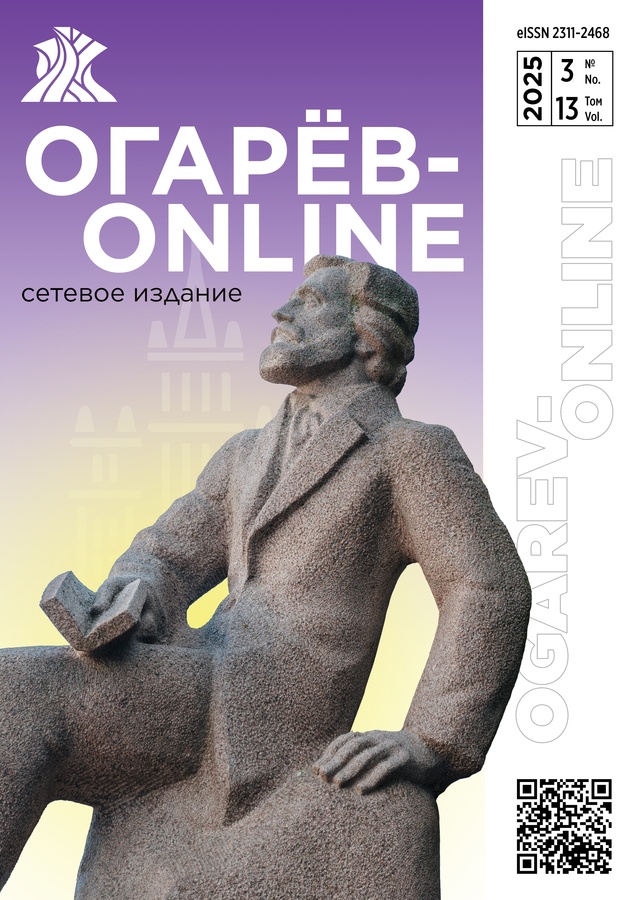Том 9, № 2 (2021)
- Год: 2021
- Выпуск опубликован: 15.02.2021
- Статей: 10
- URL: https://ogarev-online.ru/2311-2468/issue/view/18350
Весь выпуск
Влияние современного российского телевидения на формирование традиционных семейных ценностей у молодёжи
Аннотация
В статье представлен анализ российских ТВ-программ, посвященных вопросам религии, на примере православного телеканала «Спас». Отличительной чертой данного телеканала является тот факт, что тема семьи и традиционных ценностей аналитически рассматривается посредством религиозных рассуждений. В результате конфессиональный контент выстраивает и формирует традиционное представление о семье у современной российской молодежи.
 2-7
2-7


Telegram как уникальная площадка индустрии мессенджеров
Аннотация
В статье представлен контекстуальный анализ явления мессенджеров в интернет-среде. Авторы рассмотрели функциональные особенности популярного приложения Telegram. В ходе исследования было выявлено соотношение положительных и отрицательных сторон данной интернет-площадки.
 8-14
8-14


Самиздат и тамиздат как феномены независимой публицистической культуры (на материалах журнала «Синтаксис: публицистика, критика, полемика»)
Аннотация
В статье детерминируется влияние самиздата и тамиздата на советскую общественность и ее информационную культуру. Прослеживается динамика изменения политических векторов развития СССР. Акцентируется внимание на том, что любое литературное и общественно-политическое издание имеет идеологические приоритеты. В этой связи оно направляет и инициирует массовое сознание читательской аудитории в русле собственных социальных предпочтений.
 15-21
15-21


 22-26
22-26


Журналистика в межнациональном контексте: отражение этнокультурных ценностей в электронных СМИ
Аннотация
В статье подчеркивается, что журналистика как система получения, обработки, передачи информации стремится сегодня акцентировать внимание на отражении этнокультурных ценностей. Авторы отмечают, что благодаря современным инструментариям СМИ и через трансляцию межкультурного общения, дружественного диалога, международной коммуникации, журналисту удается показать толерантные отношения, взаимопонимание между разными культурами, а аудитории предоставляется возможность общения посредством оставления комментариев на полученную информацию.
 27-32
27-32


Food-журналистика как средство решения социально-значимых проблем
Аннотация
В данной статье гастрономическая журналистика рассматривается как эффективный инструмент для улучшения социальной ситуации и решения проблем нерационального использования продуктов питания, продовольственного кризиса, снижения уровня жизни. Работа имеет междисциплинарный характер, затрагивает вопросы экономики, журналистики, медицины, а также влияние пандемии коронавирусной инфекции на продовольственный кризис.
 33-41
33-41


Новостные жанры в региональных печатных СМИ
Аннотация
В статье анализируются особенности использования новостных жанров в современных региональных СМИ на примере общественно-политической газеты «Вперед», которая выходит в г. Батайске (Ростовская область). Целью работы является анализ новостных жанров в газете «Вперед». Для достижения данной цели были поставлены следующие задачи: охарактеризовать новостные жанры в современной журналистике; дать общую характеристику региональной газеты «Вперед»; провести анализ новостных жанров в данной газете. Авторы выявили, что самым распространенным жанром в рассмотренном региональном СМИ является заметка.
 42-46
42-46


Проблемы внедрения алгоритмов искусственного интеллекта в российскую журналистику
Аннотация
В статье выявлены основные проблемы, связанные с использованием искусственного интеллекта в российских интернет-СМИ. Материалом исследования послужили работы отечественных ученых, посвященные использованию искусственного интеллекта в журналистике (N=300), научно-популярные публикации на данную тематику (N=20), а также сайты наиболее популярных федеральных и региональных СМИ (N=50). В качестве основных проблем авторы выделяют следующие: преимущество социальных медиа над интернет-СМИ; дороговизна внедрения подобных алгоритмов; использование искусственного интеллекта преимущественно в экспериментальных целях; недоверие аудитории в отношении данных технологий.
 47-53
47-53


Освещение темы спорта в медиапространстве Республики Мордовия в условиях локдауна
Аннотация
В данной статье рассматриваются медиатексты спортивной тематики, размещенные в газете «Известия Мордовии» за период с марта 2020 года по февраль 2021 года. В результате исследования были выявлены основные тенденции спортивной журналистики в Республике Мордовия с начала пандемии COVID-19.
 54-59
54-59


Жанровая специфика интервью в развлекательном ток-шоу
Аннотация
В статье рассматривается специфика жанра ток-шоу на примере телепрограммы «Вечерний Ургант» на Первом канале российского телевидения. Автором выделяются стратегии, составляющие основу речевого взаимодействия коммуникантов в процессе создания данного телевизионного продукта.
 60-65
60-65
















